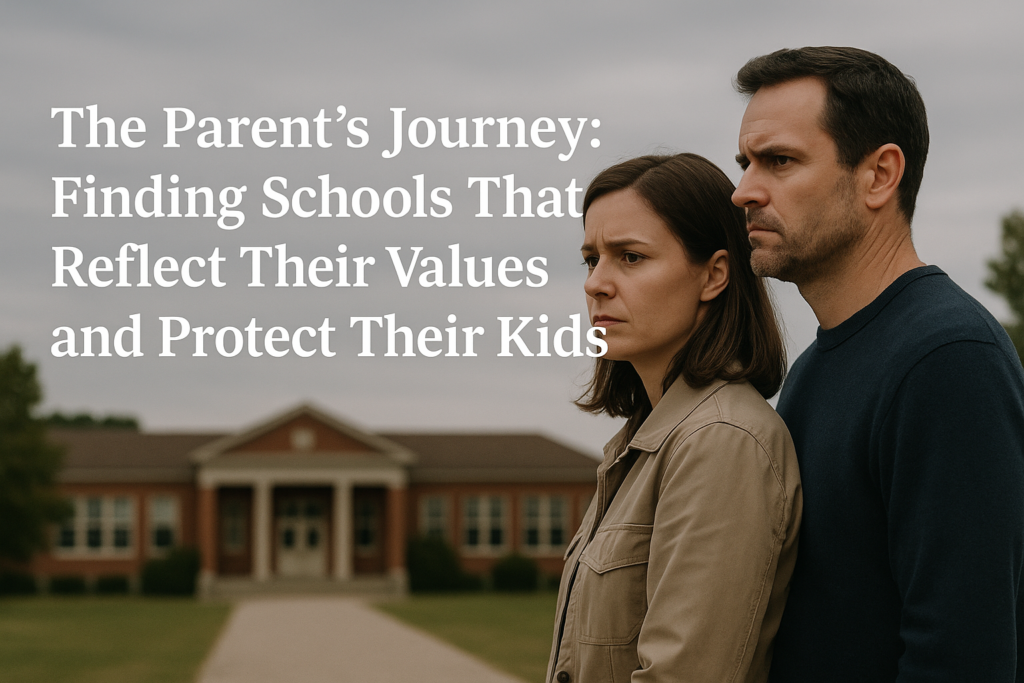
Choosing the right school used to be a straightforward decision. You looked at the district, checked the test scores, and maybe drove past the building to see the playground and classrooms. But today, the search for the right school has taken on new urgency and new stakes. For many parents, it’s no longer just about academics or college preparation. It’s about protecting childhood. It’s about shielding young minds from ideologies and content that feel intrusive, confusing, or simply out of step with their family values.
More parents than ever are pulling back the curtain on what’s happening in the classroom. They’re asking hard questions about what their children are learning, who’s teaching it, and why certain topics are being introduced at such early ages. They’re no longer assuming that what’s being taught is neutral. Instead, they’re realizing that education has become a battlefield of ideas and they’re not okay with their kids becoming the frontline.
It’s not paranoia. It’s awareness. And for many families, it’s a wake-up call that pushes them to look for something different.
Why the Teaching Style Matters
Let’s start with what most parents still want: good education. That means strong reading and math skills, solid science programs, critical thinking, and the ability to write and communicate clearly. But the how matters just as much as the what. Many traditional schools still rely heavily on standardized testing, memorization, and compliance. But there’s a growing wave of schools that emphasize creativity, inquiry, and independent thinking. That’s a good thing if it’s done responsibly.
The problem is that some schools are blending this modern approach with personal or political ideologies. Lessons are being shaped not just to teach facts or skills, but to promote particular worldviews, especially around sexuality, gender, race, and identity. It’s one thing to teach history or science. It’s another to promote beliefs about what it means to be male or female, or to encourage students to explore their sexual identity before they even understand their own biology.
For many families, that’s a line too far.
“We Just Want Our Kids to Be Kids”
This is the refrain from countless parents: we just want our kids to be kids. Childhood is short. It should be about play, curiosity, friendships, and learning the basics. There’s plenty of time for children to encounter the more complex issues of life, but those moments should come with parental guidance, not classroom agendas.
Parents have begun to speak out about how early these conversations are happening. Some report finding books in elementary school libraries that describe explicit sexual acts. Others discover that their children are being taught about gender fluidity in kindergarten or asked to share their preferred pronouns in third grade. These topics used to be left to parents to handle at home. Now, many feel those boundaries are being violated.
The issue isn’t just about content. It’s about control. Who gets to shape a child’s understanding of the world? Parents believe it should be them. Increasingly, schools seem to disagree.
What Parents Are Doing About It
So how are parents responding? They’re doing what parents have always done when the system doesn’t serve their children. They’re taking matters into their own hands.
Some are seeking out private or charter schools that share their values. Classical academies, religious schools, and values-based institutions are growing rapidly. These schools tend to prioritize academic rigor and character development, without injecting ideology into every subject. They’re intentional about letting kids be kids.
There’s also a growing network of parent watchdog groups that are pressuring school boards and legislators to bring transparency to curriculum and reading materials. These parents attend meetings, file public records requests, and push for opt-out policies. They aren’t passive anymore. They’re paying attention and they’re making noise.
Finding the Right Fit
Finding the right school isn’t easy. It takes research, patience, and a willingness to ask uncomfortable questions. Parents are reading mission statements more closely. They’re sitting in on classrooms when possible. They’re asking schools to show them exactly what their children will be reading and learning. And they’re listening to their gut.
A school doesn’t need to match a parent’s beliefs on every single point, but it should respect their right to raise their children according to their values. It should teach reading and math, not push social theories. It should nurture curiosity without confusing innocence. It should prepare students for life, not politicize their childhood.
This isn’t about censorship or fear. It’s about responsibility. Parents are not trying to shield their children from reality. They’re trying to introduce them to it in the right way, at the right time, with the right support.
The Road Ahead
We’re living in a time when educational choices matter more than ever. The days of blindly trusting the system are over. Parents are waking up to what’s really going on behind the classroom door, and they’re not just reacting. They’re responding with action.
They’re creating alternatives. They’re demanding accountability. And they’re building communities of like-minded families who refuse to hand over their children’s hearts and minds without a fight.
This journey isn’t easy. It requires sacrifice. Sometimes it means leaving a school you once loved. Sometimes it means spending money you don’t have. Sometimes it means standing up and being the only voice in the room. But more parents are realizing it’s worth it.
Because nothing matters more than our children.
And they’re counting on us to get this right.
